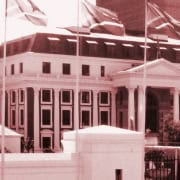|
Getting your Trinity Audio player ready...
|
Image: De Rebus
“They simply add no real value on the issues that have increased here.”
These were the words of Advocate Hangwi Matlhape, representing Public Protector Busisiwe Mkhwebane as she took her fight to have Parliament’s rules for the impeachment and removal of Chapter 9 heads declared unconstitutional, to the Constitutional Court (ConCourt). And fortunately, the ConCourt thought differently.
“They” were civil society organisations Corruption Watch (CW) and the Council for the Advancement of the South African Constitution (Casac) who joined, as amici curiae, Mkhwebane’s challenge in both the High Court and ConCourt proceedings. The two organisations supported the inquiry into Mkhwebane’s fitness to hold office.
Therefore, CW welcomed the unanimous judgment that was handed down by the Constitutional Court on 4 February 2022, in the matter of Speaker of the National Assembly and one other v The Public Protector and four others (CCT 257/21 and CCT 259/21 [2022] ZACC 01). The two applications – brought by the speaker and the DA respectively – were for leave to appeal a July 2021 Western Cape High Court judgment that partially upheld Mkhwebane’s claim of unconstitutionality. Mkhwebane also brought an application for leave to cross-appeal, should either or both of the two applications succeed – this was dismissed.
The judgment was written by Justice Nonkosi Mhlantla, with justices Mbuyiseli Madlanga, Leona Theron, Steven Majiedt, Zukisa Tshiqi, and acting justices Isaac Madondo, Dhaya Pillay, Owen Rogers, and Pule Tlaletsi concurring.
CW and Casac intervened as amici because this is a case primarily about accountability. They put forward the consideration of the allegations and a subsequent finding, as soon as possible, as being important to not only the Office of the Public Protector and the National Assembly but also to the rules of law. She should be either exonerated to restore credibility to the Office of the Public Protector or removed to prevent further damage.
Furthermore, counsel for the amici submitted that Parliament’s rules for removing the office bearer of a Chapter 9 institution are in line with international jurisprudence, and that deference should be given to Parliament’s choices. Regarding the High Court’s finding that it was unlawful for a judge to serve on the panel, they submitted that it is not unusual for the executive arm of government to appoint retired judges to head inquiries into national legislation and constitutional issues. To make such appointments brings a level of independence and legitimacy to the process which may otherwise be highly politically charged from start to finish. Such judicial appointments, in fact, protect the public protector from political harassment or interference that could arise from frivolous removal motions.
CW was represented by Advocate Michelle le Roux SC, Advocate Mukesh Vassen, and Webber Wentzel.
Public protector defeated in court again
On 4 February 2022 the ConCourt found in favour of the applicants in implementing the rules in respect of impeachment and in instituting impeachment proceedings in the manner that had transpired. It also found that a judge was perfectly placed as a member of the independent panel.
However, the court also agreed with the judgment of the Western Cape High Court that not allowing full legal representation at impeachment proceedings was irrational. This would not detract from holding Mkhwebane accountable, it noted.
With those issues now out of the way, the National Assembly may proceed with its enquiry into the removal of the public protector.
Contrary to Matlhape’s view, the ConCourt noted the submissions of the amici, saying in its judgment that the “amici curiae filed written submissions and made oral submissions, which were helpful. In this regard, the Court expresses its gratitude.”
How did we get here?
Since 2017, the public protector had faced a series of stinging court judgments and public criticisms, which included allegations of bias. The DA tabled various motions at Parliament for the public protector’s removal, and it was through these motions that it was determined that there were in fact no rules for the removal of an office bearer of a Chapter 9 institution.
Rules were subsequently drafted and adopted by Parliament, following which the speaker appointed an independent three-person panel, including a judge (in this case Justice Bess Nkabinde), to consider the evidence for the public protector’s removal. This panel concluded a prima facie case of misconduct and incompetence to hold the office, and determined that Mkhwebane’s removal was the appropriate remedy.
While the inquiry into impeachment was in its infancy stages, the public protector launched court proceedings to dispute the validity of the rules put in place by Parliament for the removal of Chapter 9 office bearers. She disputed whether or not these rules were constitutionally valid, whether they would give effect to the principle of accountability, and whether they would protect her rights. She also disputed the appointment of a judge to the independent panel, claiming this to be a threat to the separation of powers in terms of Parliament outsourcing its constitutional duties to the judiciary. She alleged that the independent panel which had found prima facie evidence for her removal, was biased.
Finally, she challenged the failure of the rules to permit legal representation in misconduct hearings.
In its July 2021 judgment the Western Cape High Court held that judges should not be part of the independent panel. It also held that not allowing legal representation was unconstitutional, though it dismissed Mkhwebane’s claim that the Chapter 9 impeachment rules were unconstitutional as a whole, finding that only certain sections were so.








